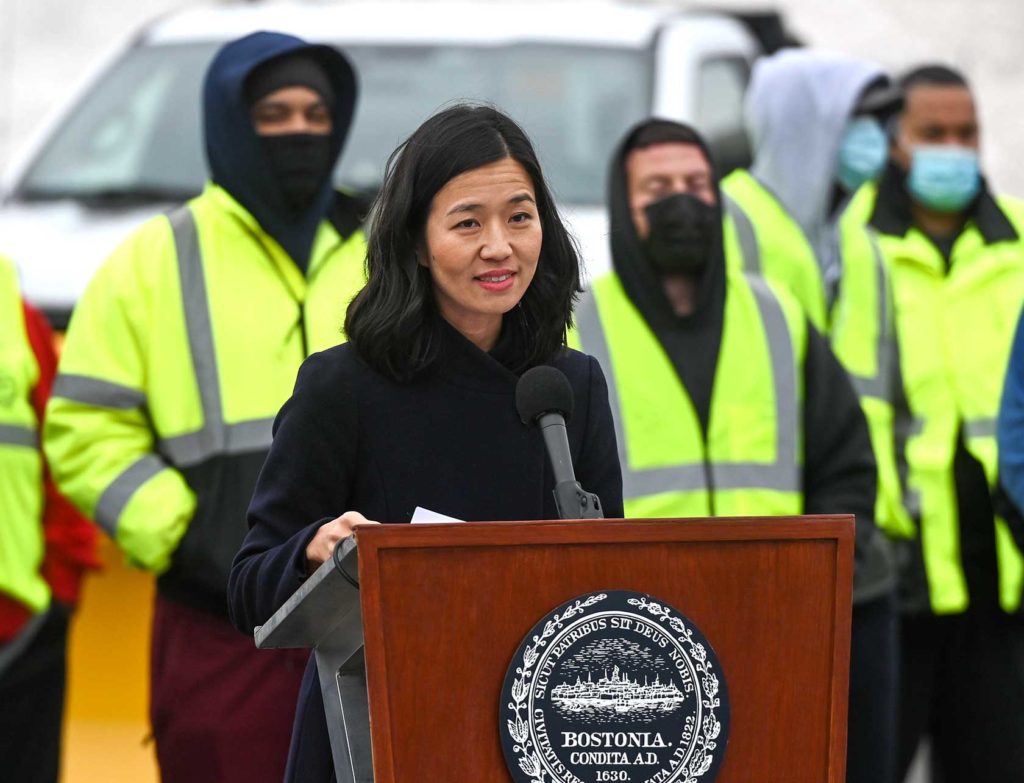Wu: lack of drivers won’t derail city’s snow removal
Mayor says city will work to diversify snow removal contractors

Boston Mayor Michelle Wu declared the city prepared for the winter season with 40,000 tons of salt, 164 pieces of in-house snow clearing equipment and a fleet of about 600 more drivers and vehicles ready to activate should a snow emergency arise.
The preparedness announcement comes amid a statewide shortage of snow plow drivers.
“Staffing is a challenge and because of that, the city has been working hard way in advance,” Wu said when asked whether there are enough drivers to move Boston’s fleet.
The city, administration officials said, has signed contracts with nine roadway clearance contractors who commit to supplying Boston with between 550 and 600 drivers to man plows when needed.
Public Works Superintendent Michael Brohel said, so far, the city is “comfortable” with staffing plans.
“We have yet to see that loss in personnel that people are talking about statewide, but we’re obviously going to keep an eye on that as this winter unfolds,” Brohel said.
This year, several municipalities boosted their hourly rates for snow plow drivers amid fierce competition for their services.
“As months go on, snow storms go on, you tend to lose some folks, add some folks, but as of right now, we feel safe and comfortable with that number,” Brohel said.
Asked how Boston has been able to retain drivers, Brohel pointed to competitive compensation.
“We do pay a premium as a major city. We tend to pay more than the smaller towns and cities across the state,” he said. “So far, we’ve gotten the firm commitment from all nine contractors that they’ve got the drivers.”
Minority contractors
Wu, who earned campaign endorsements from elected officials of color in part because of her commitment to build greater equity throughout the city, said that Boston will work to diversify its network of snow contractors and plow drivers, though the latest, three-year contracts for roadway clearance were firmed up before she took office.
“This is one of the departments and places where we’ll be really focusing on ensuring that we’ll be bringing in Boston residents, businesses of color, businesses owned by residents of color and throughout the ways that our city contracts will be turning over to ensure that we’re closing the racial wealth gap through the dollars we are putting out into the community,” Wu said.
Brohel said the city has added two minority contractors into the lineup for clearing Boston’s 32 municipal lots as a first step for diversifying the pool of snow clearance workers.
“Our idea is that will give them work, pay them city money hopefully to build them up and show them what we do on our roadways, and add them, eventually, to our roadway work,” he said.
Boston’s Public Works department is responsible for 850 miles of roadways within the city. Officials said as of right now, the response planning is being built around the assumptions of a “normal” winter, with an average snowfall of about 48 inches throughout the season.
That may be one of the rare instances where a city agency is being guided by the assumption of normalcy as the city and the world enter a third year of the COVID-19 pandemic.
Snow and schools
With child vaccinations now underway, the focus in Boston Public Schools will be on in-person learning and “there will be snow days rather than remote days,” Wu said.
Wu also said the city’s homeless population would have access to 1,000 emergency shelter spaces over the winter months through the joint efforts of the Boston Public Health Commission and several non-profits.
It is yet unclear how much of that weather emergency shelter overlaps with Wu’s forthcoming plan to house the population living in tent encampments around Massachusetts Avenue and Melnea Cass Boulevard.
The mayor has said her administration is working to identify 200 low threshold supportive beds by mid-December, but finding supportive mental health and addiction services providers to accompany the beds has proved challenging.
A winter weather guide, outlining emergency contacts, snow clearing rules and safety tips will arrive in the mail to residents this week, Wu said.
Saraya Wintersmith covers Boston City Hall for GBH News.






